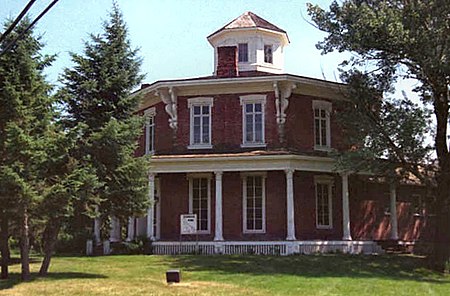Loren Andrus Octagon House
Historic house museums in MichiganHouses completed in 1860Houses in Macomb County, MichiganHouses on the National Register of Historic Places in MichiganHouses on the Underground Railroad ... and 4 more
Museums in Macomb County, MichiganNational Register of Historic Places in Macomb County, MichiganOctagon houses in MichiganUse mdy dates from May 2015

The Loren Andrus Octagon House, also known as the Washington Octagon House, is a historic octagon house located at 57500 Van Dyke Avenue just north of 26 Mile Road in Washington Township, Macomb County, Michigan. On September 3, 1971, it was added to the National Register of Historic Places.
Excerpt from the Wikipedia article Loren Andrus Octagon House (License: CC BY-SA 3.0, Authors, Images).Loren Andrus Octagon House
Carole Lane,
Geographical coordinates (GPS) Address Nearby Places Show on map
Geographical coordinates (GPS)
| Latitude | Longitude |
|---|---|
| N 42.718333333333 ° | E -83.035 ° |
Address
Carole Lane
Carole Lane
48094
Michigan, United States
Open on Google Maps






